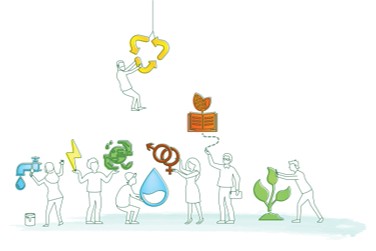Executive Summary
Grants are non-repayable funds provided by donor agencies, public institutions or charitable organizations. Grant recipients are often non-profit entities but can also be businesses or other types of organizations. The contributions are considered an investment to achieve overarching goals such as SDG 6 ‘clean water and sanitation for all’ or other development goals, to foster innovation, or to increase employment or support of the local economy. While grant providers usually don’t expect to be repaid or receive any financial return, the use of grants is typically restricted to the implementation of a specific project rather than general operating or capital expenditures. In this sense, grant providers tend to closely monitor the impact of their grant funding (Uba et al., 2020).
There are a multitude of grants, including many types that are particularly interesting for the financing and development of enterprises, such as Research and Development (R&D) grants, catalytic (enterprise development) grants or grant windows for the implementation of projects. For these, enterprises specifically qualify as recipients.
Grants are usually awarded through an application or proposal process. To ensure the selection of suitable recipients, grant providers establish funding objectives, eligibility and selection criteria, against which they evaluate and compare applicants.
Listen to the SWEP's podcast to find out what matters to access grant-based enterprise financing:
When are Grants a suitable financing option?
Who would not want to get free money? Legitimate question, but do not mistake grants for free money that comes without strings attached! There are indeed a broad range of different types of grants that can be very attractive financing options for enterprises, but finding the right grant funding options, successfully accessing them and complying with funding restrictions and reporting requirements can quickly drain your resources. Moreover, raising funding through grants and implementing project-oriented activities can distract you from executing your business model to the degree that you evolve into a project-focused NGO, rather than a financially self-sufficient company.
Having pointed this out at the beginning, here are a few different types of grants (note that different names may be used by grant providers) that can be very helpful to accelerate and scale your business at different stages:
- Research and Development (R&D) grants are designed to support the development of new products and services.
- A range of foundations, development and investment programmes provide Investment or Catalytic Grants. These programmes are often set up to provide complementary grant funding to match (more) commercial investments.
- Government agencies and Development Financing Institutions (DFIs) sometimes include grant funding to support the development of (M)SMEs or start-ups under a larger effort to push economic development.
- Moreover, donors or development programmes provide grants to achieve development objectives (usually linked to the SDGs) for which specific types of enterprises may be eligible. In case the objectives of such grants have a strong overlap with your business model, offers or strategic business initiatives, they may present an interesting financing opportunity.
The following (non-comprehensive) characteristics and implications provide you with an overview to analyse the pros and cons for this investment instrument:
| Enterprise Lifecycle | Variable but mostly early stage |
| Amount | Depending on the donor or grant provider |
| Pay-back period (Maturity) | No financial repayments but usually a need to deliver on results within 1 – 3 years |
| Use of funds | Usually restricted to specific project that is consistent with the overarching goal or mission of the grant funder and constrained by specifications for eligible expenses |
The following table summarises some key characteristics of Grant and implications you should consider:
| Characteristics | What does this mean for your enterprise |
| Grants are usually provided as a way to achieve overarching goals | The implications of this are threefold: 1) a clear impact logic or business operations in an area that is highly relevant to generate impact are in many cases a prerequisite for grant funding, 2) it is highly unlikely that you’ll find a grant funding that comes without specific conditions, and 3) you need to duly understand and align with the goals and objectives of the grant provider to successfully access their funding |
| Competitive awarding | Grants, in a way, are free money. Since they are usually awarded on a competitive basis, there tend to be (significantly) more applicants than available funding. This means that you will not only have to meet eligibility criteria and submit all required supporting documents, but you have to develop an application or proposal that is better than most others. |
| No dilution of ownership, repayment or interest, but… | While there is not requirement to pay grant money back, you as recipient need to comply with grant conditions and reporting requirements. In the case of more substantial grants, it is also common practice to establish a supervisory board that oversees (and sometimes influences) the use of funding. |
| Grants as (partial) contribution | Grants often do not cover the full amount of funding. If this is the case, you will need to pay part of the costs or find other sources of co-financing. Be aware that you will likely have to provide proof of your share of the contribution. |
| Different grants for different purposes | With countless different grant opportunities, you may lose sight of the wood for the trees. Mapping, analyzing and identifying suitable grant opportunities can end up consuming significant resources. |
Key features
-
Non-repayable: One of the main features of a grant or non-repayable loan is that the recipient is not obliged to repay the money or pay some sort of interest.
-
Co-financing: Some grants only cover part of the eligible costs. In these cases, the recipient needs to pay the other part on their own or find matching funds that can be used towards the same objectives.
-
Specificity: Grants are typically awarded for a specific project that is consistent with the overarching goal or mission of the grant funder.
-
Application process: In order to receive a grant, the applicants usually need to apply for the grant and undergo an eligibility process.
-
Catalytic grants: To be considered catalytic, grant capital should be used for proving a business model, providing capacity building services, covering opportunity costs, de-risking investments, connecting investment opportunities with available capital/funders, or addressing constraints to the enabling environment.
Grant Funding for Water-related Entrepreneurs
Water, sanitation and adjacent sectors are directly linked to the Sustainable Development Goals, which provide a global framework and orientation for donor organizations and government agencies alike. Consequently, significant grant funding has been channelled into water-related projects and funds. Beyond grants for the development of water, wastewater or waste management infrastructure or related capacity development programmes, several funds have been created to foster innovative solutions to some of the most pressing water-related challenges.
In 2016 the UN Secretary General and the President of the World Bank Group convened the United Nations High-Level Panel on Water, which called for the creation of a ‘Water Innovation Engine’ to encourage coordination and investment in water sector innovation, and “to ensure availability and sustainable management of water and sanitation for all.” Under the Global Innovation Fund, entrepreneurs, new ideas, and flexible financing have been brought together to accelerate innovation in the water sector among others. The Fund’s Water Data Challenge provides an example under which criteria, enterprises are eligible for grants: While private sector investees would typically receive debt or equity finance, they become eligible for grant funding if such funds are used to create a public good.
Moreover, a range of foundations and funds have been set up that provide initial funding to reach proof of business concepts or fund the replication, scale up and commercialization of projects and business models. One example of the numerous funds providing grant to enterprises is the Islamic Development Bank’s Transform Fund, which, aside from SDG 6, supports innovations related to SDGs 2, 3, 7 and 9 that could all be relevant for environmental start-ups and enterprises.
Trickling further down to the level of development programs and projects, an increasing number of environmental and social entrepreneurship support initiatives are emerging, many of which offer different types of grants to entrepreneurs. Aside from a strong business case, a clear impact logic is usually a key requirement to qualify for grant funding.
As a water-related enterprise, you further have the option to explore grant funding for that is provided under initiatives that are geared towards economic development. An example of generic initiatives that provide funding are enpact’s ‘founder scholarships’. These and similar scholarships provide non-repayable financial support (grants) and mentoring for entrepreneurs over a specific period of time, allowing founders to fully concentrate their time and energy on their business venture.
Aside from these examples, there are lots of other types of grants that may be relevant you as an enterprise. Platforms like WASHfunders have mapped foundations and grant providers in the water sector. Moreover, many entrepreneurship support organizations and development programs share grant opportunities via their social media channels.


